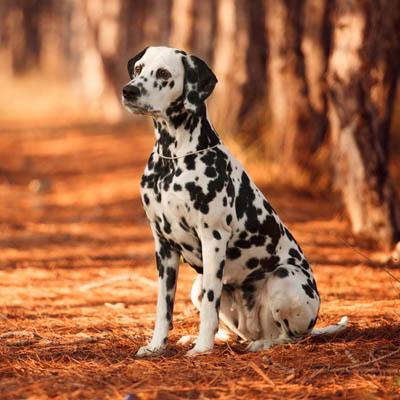Hook: Did you know that while dalmatians are commonly associated with fire stations and spotted coats, their dietary requirements can be quite unique?
Dalmatians are known for their specific dietary needs due to a genetic predisposition to forming urinary stones. While beef is often a popular choice for many dog owners, dalmatians have a specific sensitivity to purines, which are naturally found in high quantities in beef. The high levels of purines in beef can lead to the production of uric acid, which can increase the risk of developing urinary stones. It is crucial for dalmatian owners to carefully consider their dog’s diet and consult with a veterinarian to ensure they are providing the right balance of nutrients while also minimizing the risk of urinary stone formation.
Combining the breed’s history with their specific dietary requirements, it’s important to note that dalmatians have been bred as coach dogs and firefighters’ companions throughout history. Their unique role as working dogs necessitated the development of a specific diet to maintain their overall health and well-being. When it comes to feeding them beef, dalmatian owners should take precautions and opt for lean cuts or alternative protein sources to minimize the risk of purine-related issues. Approximately 30% of dalmatians either have or are at risk of developing urinary stones, making it crucial for owners to understand and prioritize their dog’s dietary needs. By working with a veterinarian, dalmatian owners can develop a balanced diet that meets their pet’s nutritional requirements while minimizing potential health risks.
Dalmatians can eat beef as part of a balanced diet. However, it is important to note that excessive consumption of beef may lead to digestive issues. Ideally, you should consult with a veterinarian to determine the appropriate amount of beef and other foods for your Dalmatian. Remember to always feed them high-quality and lean cuts of beef, cooked thoroughly to eliminate any potential bacteria or parasites.

Can Dalmatians Eat Beef? A Guide to Feeding Your Dalmatian
Welcome to our comprehensive guide on whether Dalmatians can eat beef. As a responsible dog owner, it’s essential to understand what foods are safe and healthy for your furry friend. In this article, we will explore the nutritional needs of Dalmatians and discuss the benefits and potential risks of feeding them beef. So, if you’ve ever wondered whether beef is suitable for your Dalmatian’s diet, read on to find out!
1. Understanding the Nutritional Requirements of Dalmatians
Before diving into whether Dalmatians can eat beef, let’s first examine their nutritional needs. Dalmatians are medium-sized dogs with specific dietary requirements. They require a balanced diet that includes proteins, fats, carbohydrates, vitamins, and minerals. Unlike some other breeds, Dalmatians have a unique metabolism that affects their ability to process certain foods. One key aspect to consider is their predisposition to urinary tract issues, which we’ll explore further in the following sections.
When it comes to protein, Dalmatians need a moderate amount to support their muscle development and overall health. High-quality animal proteins are recommended, as they provide essential amino acids. These can be obtained from various sources, including lean meats like chicken, turkey, and fish. But what about beef? Can Dalmatians safely consume beef? Let’s find out!
Although beef is an excellent source of protein, it’s important to consider the specific needs of Dalmatians. Due to their unique metabolism, some Dalmatians may have difficulty processing purines, which are compounds found in certain foods, including beef. This can lead to an excess buildup of uric acid, resulting in urinary stones or crystals. While not all Dalmatians are affected by this condition, it’s crucial to monitor their diet and consult with a veterinarian to ensure that beef is safe for your individual dog.
2. The Benefits of Including Beef in Your Dalmatian’s Diet
While there are potential risks associated with feeding beef to Dalmatians, it also offers several benefits when included in their diet. Beef is a rich source of high-quality protein, which is essential for supporting your Dalmatian’s muscle development, immune system, and overall well-being. It also provides important vitamins and minerals, such as iron, zinc, and B vitamins.
Additionally, beef can be an excellent option for Dalmatians who may have allergies or sensitivities to other protein sources. It’s important to note that if you choose to include beef in your Dalmatian’s diet, opt for lean cuts and avoid fatty or processed meat products. The way you prepare the beef is also crucial – avoid seasoning or using ingredients that may imbalance your dog’s diet or cause adverse reactions.
Remember, moderation is key when feeding beef to your Dalmatian. It should be part of a balanced diet that includes a variety of other ingredients. It’s always recommended to work closely with your veterinarian to determine the ideal diet for your Dalmatian based on their individual needs.
3. Risks and Considerations When Feeding Dalmatians Beef
While beef can be a valuable addition to your Dalmatian’s diet, there are potential risks and considerations to keep in mind. As mentioned earlier, Dalmatians have a predisposition to urinary tract issues. Some individuals may have difficulty processing purines, which can be found in beef. This can lead to the formation of uric acid crystals or stones. Therefore, it’s crucial to monitor your Dalmatian’s uric acid levels and consult with a veterinarian before including beef in their diet.
Moreover, it’s essential to choose high-quality beef and prepare it properly. Processed and fatty meats should be avoided, as they can lead to weight gain and other health concerns. Seasonings and ingredients like onions, garlic, and excessive salt should also be avoided, as they can be harmful to dogs.
In conclusion, while beef can offer nutritional benefits for Dalmatians, it’s essential to consider their specific dietary needs and monitor for any potential adverse reactions. Always consult with your veterinarian before making any significant changes to your dog’s diet or introducing new foods.
Adding Beef Safely to Your Dalmatian’s Diet
Now that we’ve discussed the basics of whether Dalmatians can eat beef, let’s delve into the details of adding beef safely to your Dalmatian’s diet. Here are three considerations to keep in mind.
1. Consult with Your Veterinarian
Before introducing beef or any new food to your Dalmatian’s diet, it’s crucial to consult with your veterinarian. They will assess your dog’s individual needs, consider their health history, and guide you on the appropriate dietary choices. Your veterinarian can recommend suitable protein sources, including beef, based on your Dalmatian’s specific dietary requirements.
2. Opt for Lean Cuts of Beef
When selecting beef for your Dalmatian, opt for lean cuts that are low in fat. Lean cuts, such as sirloin or ground beef labeled as 90% lean, are excellent choices. Avoid fatty cuts or processed meat products, as they can contribute to weight gain and other health issues in Dalmatians. Remember to remove any visible fat before preparing the beef.
3. Prepare the Beef Properly
Proper preparation of beef is essential to ensure it is safe and nutritious for your Dalmatian. Avoid using seasonings that contain ingredients toxic to dogs, such as garlic or onions. Never use excessive amounts of salt or other spices that may upset your dog’s stomach or cause imbalances in their diet. Cook the beef thoroughly to eliminate any potential bacteria or parasites that may be present.
Conclusion
Feeding your Dalmatian a balanced and nutritious diet is crucial for their overall health and well-being. While beef can be a valuable source of protein, it’s important to consider your Dalmatian’s specific needs and potential risks. Consult with your veterinarian and monitor your dog for any adverse reactions. By following these guidelines and providing a well-rounded diet, you can ensure that your Dalmatian stays happy and healthy for years to come.
Key Takeaways: Can Dalmatians Eat Beef?
– However, it’s important to consult a veterinarian before introducing beef into their diet.
– Some Dalmatians may have specific dietary needs due to their breed’s sensitivity to purines.
– Lean cuts of beef without added seasonings or sauces are the best choice for Dalmatians.
– Monitor your Dalmatian for any adverse reactions or allergies when introducing beef.
Frequently Asked Questions
When it comes to the diet of Dalmatians, it’s important to be mindful of what foods are safe for them to consume. Here are some questions and answers regarding whether Dalmatians can eat beef:
1. Is it safe for Dalmatians to eat beef?
Yes, it is generally safe for Dalmatians to eat beef as part of their diet. However, there are a few factors to consider. It’s important to feed lean cuts of beef to avoid excessive fat intake, which can lead to weight gain. Additionally, make sure the beef is cooked thoroughly to eliminate the risk of bacterial contamination.
Remember, every dog is unique, so it’s always a good idea to consult with your veterinarian to ensure that beef is suitable for your Dalmatian and to determine the appropriate portion size.
2. Are there any risks associated with feeding Dalmatians beef?
While beef can be a safe and nutritious addition to a Dalmatian’s diet, there are a few risks to be aware of. Some Dalmatians may have allergies to certain proteins found in beef, which can cause skin irritations, digestive issues, or other allergic reactions. It’s important to monitor your dog for any signs of an adverse reaction after introducing beef to their diet.
Additionally, excessive consumption of fatty cuts of beef can lead to pancreatitis in dogs, which is a serious condition that requires veterinary care. To minimize these risks, opt for lean cuts of beef and moderate the portion size to ensure a balanced diet for your Dalmatian.
3. Is raw beef safe for Dalmatians?
Feeding raw beef to Dalmatians is a topic of debate among dog owners and experts. While some people advocate for a raw food diet for dogs, including raw beef, there are potential risks involved. Raw meat can contain harmful bacteria such as salmonella or E. coli, which can pose health hazards to both dogs and humans. It’s crucial to handle raw meat safely and ensure proper hygiene to minimize these risks.
If you are considering feeding raw beef to your Dalmatian, it’s important to do thorough research and consult with a veterinarian to weigh the potential benefits and risks. They can provide guidance on safe handling and preparation methods.
4. Can Dalmatians have beef as a treat?
Yes, Dalmatians can have beef as an occasional treat. It’s important to remember that treats should not make up a significant portion of a dog’s diet and should be given in moderation. When offering beef as a treat, make sure it is cooked, lean, and free of seasoning or additives that could be harmful to your dog.
Keep portion sizes small and use beef treats as a reward or training tool. It’s always a good idea to speak with your veterinarian about incorporating treats into your Dalmatian’s diet and to determine what type and amount of treats are appropriate for their specific needs.
5. Can Dalmatians eat beef bones?
No, it is not recommended to give Dalmatians beef bones. Cooked bones, especially those that have been roasted or grilled, can splinter and pose a choking hazard or cause damage to a dog’s digestive tract. These sharp fragments can lead to serious injuries or blockages that may require surgical intervention.
Instead, consider safe alternatives such as specially-designed dog chew toys or dental treats that are specifically made to promote dental health and satisfy your Dalmatian’s chewing instincts. Always prioritize your dog’s safety and consult your veterinarian for guidance on suitable chewing options.

Summary
Dalmatians can eat beef, but it should be cooked and given in moderation. Raw beef can be harmful because it may contain bacteria.
If you want to give your Dalmatian beef, make sure it’s lean and free of seasonings or additives that could upset their stomach. It’s always best to consult with your vet before introducing any new food to your dog’s diet.
